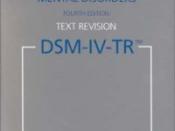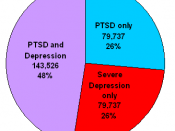Introduction: Although Post Traumatic Stress disorder (P.T.S.D.) was not given a clinical name until 1980, it had been around for many years before that. It was known as shell shock, battle fatigue, accident neurosis, and post-rape syndrome until the American Psychological Association gave it a formal name (Bayes, 1998, History, 1). P.T.S.D. is defined as ?an anxiety disorder in which fear and related symptoms continue to be experienced long after a traumatic event? (Comer, 2002, p.142).
In the previous version of DSM (DSM-III) a criterion of Post Traumatic Stress Disorder was for the sufferer to have faced a single major life-threatening event; this criterion was present because a) it was thought that PTSD could not be a result of \"normal\" events such as bereavement, business failure, interpersonal conflict, bullying, harassment, stalking, marital disharmony, working for the emergency services, etc, and b) most of the research on PTSD had been undertaken with people who had suffered a threat to life (e.g.
combat veterans, especially from Vietnam, victims of accident, disaster, and acts of violence).In DSM-IV the requirement was eased although most mental health practitioners continue to interpret diagnostic criterion A1 as applying only to a single major life-threatening event. There is growing recognition that Post Traumatic Stress Disorder can result from many types of shocking experience including an accumulation of small, individually non-life-threatening life events (Bullyonline, 2003).
Individuals who have experienced a traumatic event oftentimes suffer psychological stress related to the incident. In most instances, these are normal reactions to abnormal situations. Some of these symptoms to look out for include recurring thoughts or nightmares about the event, having trouble sleeping or changes in appetite, experiencing anxiety and fear, especially when exposed to events or situations reminiscent of the trauma, being on edge, being easily startled or becoming overly alert, feeling...


